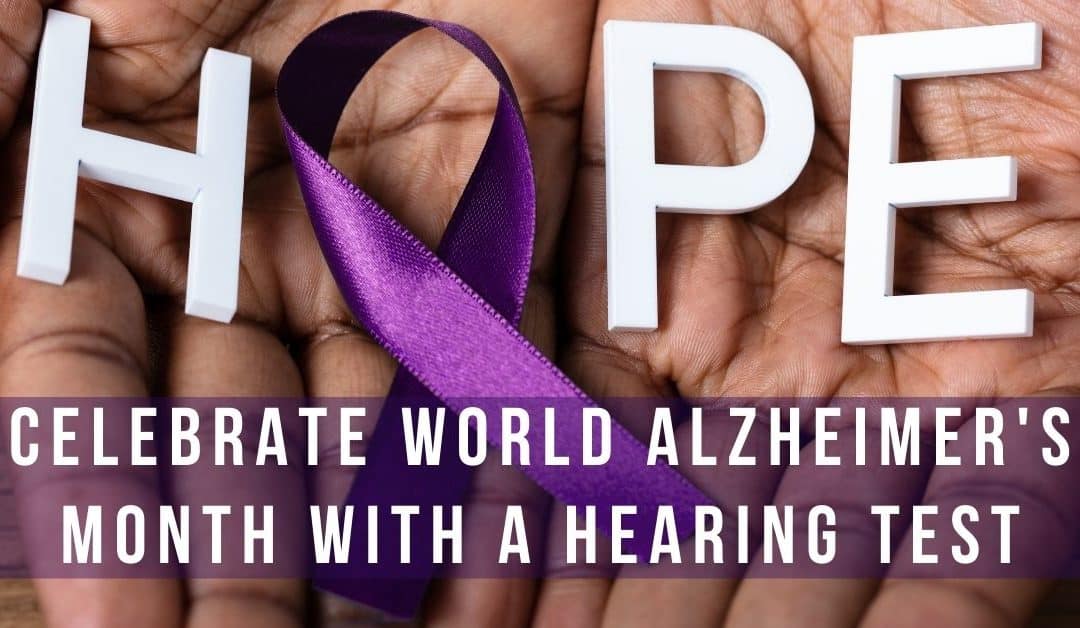September is World Alzheimer’s Month! Launched in 2012, World Alzheimer’s Month is a global campaign dedicated to raising awareness about the prevalence of Alzheimer’s. It is also an international effort to develop better ways of preventing the disease which remains incurable. Alzheimer’s is a type of dementia that impacts nearly 6 million people in the U.S. Dementia refers to a range of medical conditions that are characterized by cognitive decline – reduced ability to make decisions, think, remember, concentrate etc. There are different types of dementia by Alzheimer’s is the most severe and common form, accounting for 60-80% of all cases.
Research has shown that hearing loss is a contributing factor, and by treating hearing impairment, you can reduce your risk of developing cognitive decline. An important step you can take this month is scheduling an appointment to have your hearing tested!
Hearing Loss
Hearing loss is the third most common chronic health condition that older adults experience. According to the National Institute on Deafness and Other Communication Disorders:
- 1 in 8 people (ages 12 and older) have some degree of hearing loss
- 25% of adults 65-74 gave hearing loss
- 50% of adults 75 and older have disabling hearing loss
This prevalent condition can be caused by several factors including: existing medical conditions (cardiovascular disease, hypertension, diabetes etc.), exposure to loud noise, aging, and genetic history. impaired hearing results in a limited ability to hear and process sound which causes a range of symptoms including:
- Tinnitus: a buzzing, ringing, clicking, humming like noise in one or both ears
- Increasing the volume on electronic devices
- Sounds are muffled and unclear
- Frequently asking others to repeat themselves, speak louder and/or slower
- Difficulty hearing especially in environments with background noise
- Reading mouths to identify specific words
- Confusion during conversations
Untreated hearing loss can worsen these symptoms and contribute to the development of Alzheimer’s.
Link Between Alzheimer’s & Hearing Loss
Research has identified a strong correlation between Alzheimer’s and hearing loss. Studies show that hearing loss actually accelerates the development of cognitive decline; revealing that compared to people without hearing loss, cognitive decline can be:
- twice as likely for people with mild hearing loss
- three times as likely for people with moderate hearing loss
- and up to five times likely for people with severe hearing loss
These statistics also highlight that the degree of hearing loss increases the risk of cognitive decline. How exactly hearing loss contributes to Alzheimer’s remains uncertain but researchers suggest a few theories:
- cognitive overload caused by the extra energy the brain uses trying to process sound
- social withdrawal, a common effect of hearing loss, reduces the amount of stimulation and energy the brain and body receives
Fortunately, there are effective ways that hearing loss is treated. Treatment can drastically improve health outcomes.
What to Expect from a Hearing Test
Hearing tests are relatively quick and easy! The first step is to schedule an appointment with a hearing healthcare specialist – likely an audiologist who specializes in diagnosing and treating hearing and balance related disorders. You can expect to experience the following during your appointment:
- Medical intake: like most medical appointments, your hearing health history will be collected – conditions, medications, genetic history, symptoms etc.
- Hearing test: is conducted with an audiometer which is an instrument that plays sounds at various pitches and frequencies. You will be wearing headphones connected to the audiometer and in a quiet room (or sound booth). The audiologist will guide you through the sounds and you will indicate what you can hear.
- Results: you will be shown your results on a chart that visually represents your hearing ability in both ears. This will also indicate any impairment and the degree of hearing loss you may be experiencing.
Luckily, there are several useful ways that hearing loss is treated. The most common treatment is hearing aids which are electronic devices that help absorb, amplify, and process sound. Treating hearing loss has countless benefits including strengthening communication, improving relationships, and boosting confidence. Additionally, treating hearing loss decreases the risk of developing medical conditions like Alzheimer’s, enhancing overall health, longevity, and quality of life!
Contact us today to learn more about our comprehensive hearing health services.

